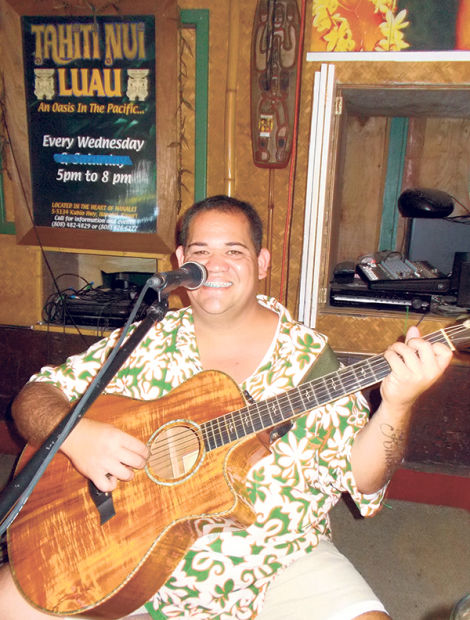HANALEI – In every performance, Keola Worthington recognizes the lovers in the audience, not just because he wants to honor them but because he loves everybody.
“I come from humble beginnings,” said the Kauai born and raised musician.
His personal heritage reads like a who’s who in Hawaiian history. His is an ancestry steeped in Hawaiian history going back to the days even before the appearance of King Kamehameha off the shores of Hawaii. Every chance he gets, on stage or to anybody who seems remotely interested, Worthington will “talk story” about Hawaiian culture. His body is a walking symbol in and of itself with a tattoo that spells out “Kiilehua” on his left arm and an amakua tattoo of a stingray on his right arm.
“Boy, one day you’ll become a performer,” were the encouraging words spoken to Worthington by the late, great Hawaiian recording sensation Israel “Iz” Kaanoi Kamakawiwoole.
He also used to tell Worthington, “As we get larger, we become the musician, not the dancer.”
Those were the days when the 32-year-old would either play before or with Iz. Worthington began performing as a hula dancer at the age of 4 and transitioned to the ukulele when he was 12.
“I’ve had the opportunity to meet many other performers,” Worthington said. “Every one of them had a little bit of something I liked.”
And he loves to weave their stories with his Hawaiian history during his sets at Tahiti Nui in Hanalei. That after traveling extensively for years, including tours in Japan playing Hawaiian music and telling stories.
“My great-great-grandfather invented the steel guitar,” Worthington told the crowd on a Sunday night at Tahiti Nui.
That and the creation of the shaka, or “hang loose” hand sign, come from his ancestors, he said.
“Palani Vaugh, my cousin was the ‘chosen one’ in the generation before me that had all the Hawaiian knowledge. Now the family is passing the torch to me to carry on,” Worthington explained.
Worthington calls himself a “fighter,” wanting to preserve and maintain Hawaiian culture.
“A lot of music and culture is being diluted and commercialized,” Worthington said. “It is OK to do that as long as we spread the music with honor to our ancestors who came before us.”
Health issues caught the musician and historian off guard. It kept him from performing for a couple years. Now he is back on stage after using that free time to compose music.
“I’ve connected with the spirituality during this break,” Worthington said. “I appreciated it when I was well, but having health issues was a huge, humbling experience for me. Very humbling. What saved me was Native Hawaiian plants and eating healthy.”
The “Kiilehua” tattoo on his left arm is a tribute to his great-great-grandparents. He cherishes journal entries from the 1960s recorded by his great-great-grandmother. She wrote about the family’s land, the land she lived on – more than 6,000 acres in Laiewai on Oahu.
“This land keeps eroding away and my Hawaiian people keep fading away,” she wrote. “One day, my home will be forever gone. I will never forget where I came from.”
Worthington noted he will continue to relish his rich ancestry and always remember those who came before him.
• This is an ongoing weekly feature in The Garden Island. It focuses on everyday people who reflect the spirit that makes Kauai the place it is today. If you know of somebody you’d like to see featured email features and education reporter Lisa Ann Capozzi at lcapozzi@thegardenisland.com.





